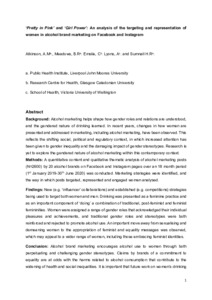Atkinson, AM, Meadows, BR, Emslie, C, Lyons, A and Sumnall, H (2021) 'Pretty in Pink' and ' Girl Power': An analysis of the targeting and representation of women in alcohol brand marketing on Facebook and Instagram. International Journal of Drug Policy, 101. ISSN 0955-3959
![‘Pretty in Pink’ and ‘Girl Power’ An analysis of the targeting and representation of women in alcohol brand marketing on Facebook and Instagram .pdf [thumbnail of ‘Pretty in Pink’ and ‘Girl Power’ An analysis of the targeting and representation of women in alcohol brand marketing on Facebook and Instagram .pdf]](https://researchonline.ljmu.ac.uk/16189/3.hassmallThumbnailVersion/%E2%80%98Pretty%20in%20Pink%E2%80%99%20and%20%E2%80%98Girl%20Power%E2%80%99%20An%20analysis%20of%20the%20targeting%20and%20representation%20of%20women%20in%20alcohol%20brand%20marketing%20on%20Facebook%20and%20Instagram%20.pdf)  Preview |
Text
‘Pretty in Pink’ and ‘Girl Power’ An analysis of the targeting and representation of women in alcohol brand marketing on Facebook and Instagram .pdf - Accepted Version Available under License Creative Commons Attribution Non-commercial No Derivatives. Download (943kB) | Preview |
Abstract
Background: Alcohol marketing helps shape how gender roles and relations are understood, and the gendered nature of drinking learned. In recent years, changes in how women are presented and addressed in marketing, including alcohol marketing, have been observed. This reflects the shifting social, political and regulatory context, in which increased attention has been given to gender inequality and the damaging impact of gender stereotypes. Research is yet to explore the gendered nature of alcohol marketing within this contemporary context.
Methods: A quantitative content and qualitative thematic analysis of alcohol marketing posts (N = 2600) by 20 alcohol brands on Facebook and Instagram pages over an 18 month period (1st January 2019–30th June 2020) was conducted. Marketing strategies were identified, and the way in which posts targeted, represented and engaged women analysed.
Findings: New (e.g. ‘influencer’ collaborations) and established (e.g. competitions) strategies were being used to target both women and men. Drinking was presented as a feminine practice and as an important component of ‘doing’ a combination of traditional, post-feminist and feminist femininities. Women were assigned a range of gender roles that acknowledged their individual pleasures and achievements, and traditional gender roles and stereotypes were both reinforced and rejected to promote alcohol use. An important move away from sexualising and demeaning women to the appropriation of feminist and equality messages was observed, which may appeal to a wider range of women, including those embracing feminist identities.
Conclusion: Alcohol brand marketing encourages alcohol use to women through both perpetuating and challenging gender stereotypes. Claims by brands of a commitment to equality are at odds with the harms related to alcohol consumption that contribute to the widening of health and social inequalities. It is important that future work on women's drinking and alcohol marketing is situated within the shifting social-political climate in which traditional, post-feminist and new fourth wave feminist rhetoric and femininities co-exist.
| Item Type: | Article |
|---|---|
| Uncontrolled Keywords: | 11 Medical and Health Sciences, 16 Studies in Human Society, 17 Psychology and Cognitive Sciences |
| Subjects: | B Philosophy. Psychology. Religion > BF Psychology H Social Sciences > HQ The family. Marriage. Woman H Social Sciences > HF Commerce > HF5001 Business > HF5410 Marketing. Distribution of Products R Medicine > RA Public aspects of medicine > RA0421 Public health. Hygiene. Preventive Medicine |
| Divisions: | Public and Allied Health |
| Publisher: | Elsevier |
| Related URLs: | |
| Date of acceptance: | 19 November 2021 |
| Date of first compliant Open Access: | 11 December 2022 |
| Date Deposited: | 31 Jan 2022 11:47 |
| Last Modified: | 20 Feb 2023 15:31 |
| DOI or ID number: | 10.1016/j.drugpo.2021.103547 |
| URI: | https://researchonline.ljmu.ac.uk/id/eprint/16189 |
 |
View Item |

 Export Citation
Export Citation Export Citation
Export Citation